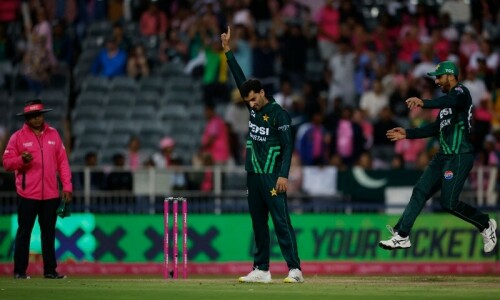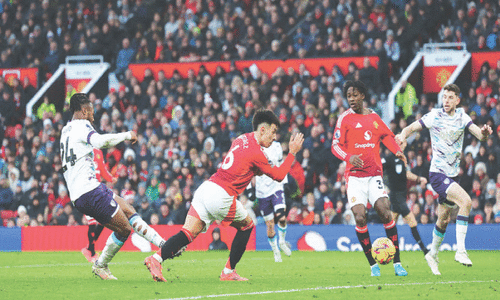
LONDON: Pakistan cricketers Salman Butt and Mohammad Asif were convicted Tuesday of fixing parts of a test match in the most serious corruption scandal to hit the sport in more than a decade.
Eleven years after South Africa captain Hanse Cronje was banned for life for taking bribes from bookmakers, a jury at London's Southwark Crown Court found former captain Butt and bowler Asif guilty of both counts of conspiracy to cheat and conspiracy to accept corrupt payments as part of a betting scam.
The 12 jurors were unanimous in their decision that both players were guilty of conspiracy to cheat, but could only reach a 10-2 majority verdict on the charges that the pair took money to do so.
The jury took 16 hours to rule that Butt was guilty of both offenses and that Asif had deliberately bowled no-balls against England in August 2010. But it needed another three hours to decide by a 10-2 margin that Asif was also guilty of the more serious charge of accepting payment for the fix.
Butt, Asif and Fast bowler Mohammad Amir, who had already pleaded guilty to both charges, could be jailed for up to seven years when they are sentenced later this week.
''Match-fixing is not just unsportsmanlike but is a serious criminal act,'' Crown Prosecution Service lawyer Sally Walsh said. ''The actions of these two top international players went against everything that was expected from someone in their positions and they failed to take into account their fans of all ages and nationalities when deciding to abandon the values of sportsmanship so unconditionally.
''People who had paid good money to see a professional and exciting game of cricket on the famous ground of Lord's had no idea that what they were watching was not a true game, but one where parts of the play had been predetermined for cash.''
Prosecutors said Butt and Asif conspired with sports agent Mazhar Majeed to ensure the delivery of three intentional no-balls at Lord's. Asif and Amir overstepped by such a margin that match commentators at the time remarked with incredulity at the sloppiness of their play.
''This was cheating pure and simple,'' Metropolitan Police Detective Chief Superintendent Matthew Horne said. ''They let down everybody that bought tickets and they let down children when they are role models for those very children that are playing such a special game.''
The 27-year-old Butt, Asif and Amir have already received lengthy suspensions from an International Cricket Council anti-corruption tribunal in Doha for fixing parts of the test match.
Butt was banned for 10 years, five of which are suspended, Amir was banned for five years and Asif was given a seven-year ban, with two suspended.
Whereas Cronje _ who died in a plane crash in 2002 _ received immunity from criminal prosecution in exchange for his admission of fixing, the Pakistan players still faced a court case after their sporting punishment.
The allegations originally surfaced after Majeed was recorded by an undercover reporter working for the now-defunct News of the World tabloid saying that the three Pakistan players had accepted money to fix betting markets.
Majeed was secretly filmed accepting 150,000 pounds ($242,000) in cash from the journalist.
Butt said he had ignored the requests from Majeed, his agent, and the 28-year-old Asif _ who reached No. 2 in the ICC's test bowling rankings the month before the Lord's test _ said he had only bowled the no-ball at precisely the time Majeed said it would be delivered because Butt had told him to run faster moments before bowling.
Judge Jeremy Cooke previously told the London jurors to accept that the 19-year-old Amir was involved, with his guilty plea not revealed until after the verdicts.
The jury initially retired at midday Thursday but reported to Cooke on Monday that it was unable to reach an unanimous decision.
Criminal prosecution for sports corruption remains rare in Britain, with arguably the most notable case being the imprisonment of footballer Tony Kay 47 years ago.
The one-time England international was convicted of conspiracy to defraud over allegations he bet on his Everton side to lose a match. He served 10 weeks of a four-month sentence and never again played professionally.
Pakistan captain Salim Malik and a teammate became the first cricketers to be banned for match-fixing in 1999, with Cronje and former India captain Mohammed Azharuddin banned the following year after Cronje admitted to forecasting results in exchange for money from a London bookmaker.
The ICC created its Anti-Corruption and Security Unit in response to the incidents. Widespread corruption is widely held to have been stamped out, but isolated cases still occur.
West Indies batsman Marlon Samuels was banned for two years in 2008 over allegations he passed on information to a bookmaker.














































